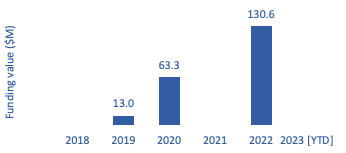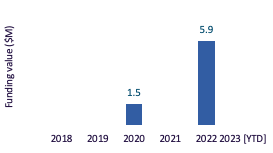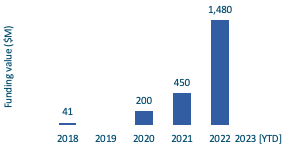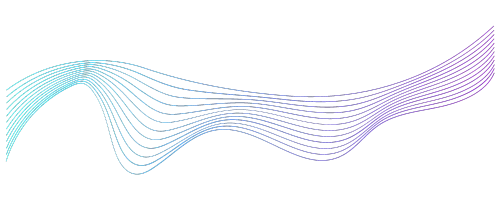Startup Series (4/4): Deep Tech Disruptors
The Startup series on Industrial Innovation: Nanotech, Quantum Computing, Robotics, Spacetech
Nanotech
NanoTech opens a realm of opportunities through the manipulation of elements at the nanometer level, focusing on the scientific, engineering, and utilization of materials and inventions which have nanoscaled structures and characteristics.
Subdomains:
Nano bubbles: These are minuscule gas-filled bubbles at the nanoscale. They help increase oxygen transportation in biological tissues, support water cleaning, and provide new methodologies for diagnostics and drug delivery.
Drug delivery: This allows for accurate targeting and regulated dispensation of medical agents at the nanoscale, in turn enhancing the effectiveness of drugs and reducing side effects.
Microfabrication: This involves the creation of detailed microstructures and gadgets at the nanoscale. It's key in the semiconductor manufacturing sector and can also be employed to create sensors, actuators, and medical devices.
Nanomanufacturing: This entails the large-scale production of nanoscale materials, structures, and gadgets. It promotes ongoing miniaturization and enhancements in efficiency, fueling innovations in electronics, medicine, energy, and material science.
Nanomaterials: These are tailored substances with distinct properties at the nanoscale level, usually providing excellent electrical, thermal, and mechanical features. This includes innovations like carbon nanotubes, quantum dots, and graphene.
Nanotech Startup Profiles
RS Research
RS Research is a clinical-stage biotechnology company that discovers and develops smart nanomedicines for targeted chemotherapy.
Its proprietary drug delivery platform enables the creation of specific drug options for various medical conditions. The platform enhances chemotherapy's effectiveness while minimizing side effects across multiple conditions.
Key offerings
Sagitta technology enables nanomedicine to target receptors on tumor cells, minimizing harm to healthy cells and reducing side effects. This technology helps optimize cancer treatment by using biodegradable conjugation platforms that enhance effectiveness, pharmacokinetics, and manufacturability.
Recent updates
December 2021: RS Research announced that the first patient has been dosed in the Phase I clinical trial evaluating the safety of RS-0139 in NSCLC.
December 2021: RS Research secured $12 million in Series A funding led by Gen Iiac to expedite clinical development of its portfolio.
Funding Trends
2017: $1.18M
2021: $ 12M
Key Investors
ATLANT 3D Nanosystems
ATLANT 3D Nanosystems specializes in advanced technologies for on-demand atomic layer 3D printing. Their technology integrates atomic layer deposition, micro-electromechanical systems, and 3D printing to accelerate material development and precise prototyping of micro and nanodevices.
Key Offerings:
ATLANT3D Technology: An advanced manufacturing technology that enables precise printing on various surfaces through hybrid microreactor direct atomic processing.
Nanofabricators: Support multi-material and atomic layer manufacturing for prototyping and manufacturing micro and nanodevices.
Nanofabricator Lite: Allows easy switching between different substances and reactants for material deposition or testing.
Recent Updates:
May 2023: Partnership with ESA to develop technology for manufacturing electronic components in space using ATLANT 3D’s direct atomic layer processing technology.
June 2021: Secured NASA as a customer and launched a zero-gravity advanced solution for direct writing of thin-film materials for in-space and in-lab prototyping and manufacturing
Funding Trends
2022: $15M
Key Investors
Moleaer
Moleaer specializes in developing industrial-scale nanobubble technology for chemical-free water treatment, sustainable food production, and resource recovery. The company's technology infuses nanobubbles into water, supersaturating it with oxygen or other gases to create mild oxidants for disinfection. This technology is applied in farming, horticulture, water treatment, and natural resource recovery.
Key Offerings:
Nanobubbles-as-a-Service (NaaS): Provides mass gas transfer and nanobubble technology that can quickly respond to seasonal demands and unexpected conditions, avoiding upfront capital costs.
Water Quality and Equipment Monitoring: Offers remote monitoring solutions with nanobubble generators to simplify monitoring, improve water quality tracking, and streamline system operations.
Recent Updates:
August 2023: Moleaer established Moleaer AS in Norway, focusing on sustainable nanobubble solutions for the marine fishery and aquaculture production markets.
November 2022: Collaboration with BASF to enhance copper recovery in mining sites using innovative technologies.
July 2022: Expansion of their nanobubble generator portfolio with the introduction of Kingfisher for lakes and ponds.
Funding Trends:
2018: $6M
2019: $5M
2021: $9M
2022: $40M
Key Investors:
Hummink
Hummink develops additive manufacturing technology that enables precise design and production at the nano-level.
The company’s technology integrates nanometric pens with an oscillating macroresonator for precise ink placement. It adjusts to different types of ink or surface requirements through electronic control.
Key Offerings:
Nazca: A prototyping machine that employs liquid deposition technology for producing electronics and PCB parts using liquid feedstock. It also utilizes high-precision capillary printing technology for nano-electronics products.
Recent Updates:
September 2023: Hummink announced its role as a founding member of the Printup Institute, focusing on the development of printed electronics for the design and production of medical devices.
August 2023: Duke University's SMIF Facility showcased a demonstration of the Hummink high-precision capillary printing NAZCA system.
Funding Trends:
2020: $0.8M
2022: $5.2M
Key Investors:
Impact Nano
Impact Nano is a manufacturer of specialty chemicals that facilitate sustainable computing using advanced materials. The company aims to tackle challenges in energy transition and health by employing green chemistry and circular manufacturing methods. Its primary markets are the semiconductor, green energy, and pharmaceutical industries.
Key Offerings: The company develops tier 2 advanced materials using ligand-organometallic silicon and fluorine chemistry. This approach allows for the safe manufacturing of air-sensitive chemicals.
Recent Updates:
August 2021: Secured a license for flammable and combustible liquids and gases at its Orange facility.
May 2023: Raised $32 million from investors, including Intel Capital and Goldman Sachs Asset Management, to expand its Massachusetts factory
Funding Trends: Impact Nano has secured a total of $32 million in funding as of 2023.
Key Investors:
Quantum computing
Quantum Computing Overview: Quantum computing utilizes the principles of quantum mechanics to enhance computing power and capabilities. It has the potential to transform various industries by solving complex problems that are beyond the scope of classical computers.
Key Sub-Domains in Quantum Computing:
Ion-based: This approach uses trapped ions as quantum bits (qubits) to perform complex calculations. The precise manipulation of ions' quantum states enables the execution of quantum algorithms.
Photonics: Involves using photons (particles of light) as qubits. It offers advantages in terms of scalability, long-distance quantum communication, and integration with existing optical technologies.
Qubit Control: Refers to techniques for controlling and manipulating qubits, crucial for executing quantum algorithms and implementing quantum error correction, essential for the stability and reliability of quantum computers.
Quantum Accelerating Tools: These are hardware and software solutions designed to accelerate quantum computations. They include quantum processors, quantum simulators, and quantum software libraries that aid in the development of quantum algorithms and problem-solving.
Superconducting Circuit-Based: Utilizes superconducting materials and Josephson junctions to create qubits. This method shows promise in developing scalable and error-resistant quantum processors.
Quantum computing Startup Profiles
eleQtron
eleQtron is a spin-off from the chair of quantum optics at the University of Siegen. It develops and operates quantum computers, focusing on machines based on trapped ions, RF control, and Magnetic Gradient Induced Coupling (MAGIC). The company offers quantum computer performance on a subscription model.
Key Offerings: The MAGIC quantum computer, which uses the MAGIC technique for precise, reliable, and cost-effective control of ion qubits. This technology also integrates individual control of qubits into trap chips, enhancing their quality.
Recent Updates:
June 2023: Partnership with Infineon to co-develop trapped ion Quantum Processor Units (QPUs) for scalable quantum computers.
December 2021: Collaboration with ParityQC within the ATIQ consortium to aid in the development of scalable quantum computers.
Funding Trends: 2020 ($49.6 M)
Key Investors
PsiQuantum
PsiQuantum is focused on building a commercially viable quantum computer to address challenges in various sectors such as climate tech, energy, pharmaceuticals, defense, and financial services. The company employs a photonics-based architecture for building large-scale, fault-tolerant quantum computers, which can be manufactured in standard silicon chip facilities.
Key Offerings: The company conducts research on methods for quantum error correction, algorithms, and architecture, utilizing existing manufacturing processes and infrastructure to construct quantum computers.
Recent Updates:
March 2023: Opened a UK-based research facility to develop high-power cryogenic systems for large-scale quantum computing.
January 2023: Signed a contract with the Defense Advanced Research Projects Agency (DARPA) for the Utility-Scale Quantum Computing program, aligning with the U.S. government's objectives to support the development of near-term quantum computers.
Funding Trends: PsiQuantum has received significant funding, totaling $895 million, with its latest funding round (Series D) bringing in $450 million in 2021.
Investors:
Alice & Bob
Alice & Bob develops quantum computers with minimal errors, aiming to assist industries and researchers.
The company’s technology utilizes self-correcting superconducting quantum bits, enabling reliable quantum computing for a wide range of algorithms which helps researchers solve complex problems with improved accuracy.
Key offerings
algorithms,Cat qubits: A solution to address errors in quantum computing that reduces the need for hardware for a quantum computer, up to 60 times less than other qubit technologies.
Recent updates
July 2023: Alice & Bob announced new research, conducted in collaboration with its academic partners at Laboratoire de Physique de l’ENS, Mines Paris and Laboratoire de Physique de l’ENS de Lyon, demonstrating design advances for its superconducting ‘cat qubit.’
November 2022: Alice & Bob tested Azure quantum resource estimator, highlighting the need for fault-tolerant qubits.
Funding Trends
Terra Quantum
Terra Quantum specializes in creating programs for the quantum technology atmosphere and value chain. Their services are based on quantum computing, hardware, software, and algorithms, with specialties such as hybrid quantum optimization and hybrid quantum neural networks. These offerings can be found in industries including energy, automotive, financial services, life sciences, and healthcare.
Key offerings
Quantum-as-a-Service provides a hardware-independent suite of quantum algorithms for customised application development and optimised performance.
It also offers a hybrid combination of quantum and classical computing to accelerate speed and efficiency.
Additionally, this service integrates Quantum Key Distribution (QKD) and Quantum Cryptography to make communication between systems and devices more secure.
Recent updates
September 2023: Terra Quantum and HSBC announced a partnership to explore hybrid quantum technology applications on optimization challenges for business impact.
June 2023: Terra Quantum acquired Divis Intelligent Solutions to accelerate algorithm development.
April 2023: Terra Quantum developed a hybrid quantum computing prototype for Evonik.
Funding Trends
Key Investors
IQM
IQM is a business that specializes in creating hardware for quantum computing and implementing superconducting technology. They supply quantum computers for research facilities and supercomputer centers, as well as offering custom-made co-designs for industrial customers to help them reach a quantum advantage.
Key offerings
IQM technology: Its second-generation quantum processors use proprietary on-chip components to increase the QPU clock speed.
IQM spark: A qubit superconducting quantum computer that allows users to reproduce a range of experiments and create innovative research results.
IQM academy: Offers free online quantum training courses to educate and prepare talent for the quantum workforce.
Recent updates
July 2023: T-Systems signed an MoU with IQM to provide its customers with cloud access to IQM’s quantum systems.
April 2023: IQM expanded its global operations into APAC with an office opening in Singapore to drive the advancement of quantum technology.
Robotics
Focuses on the design, development, and application of autonomous or semi-autonomous machines to develop solutions for enhancing efficiency, safety, and precision.
Subdomains
Industrial robots: Carry out duties such as welding, putting together, painting, and handling materials in industrial plants and production lines. Strives to maximize efficiency and security in manufacturing processes.
Drones: Drones that are either completely or partially automated, carrying sensors and cameras to acquire data and monitor, can be applied for various tasks such as agricultural management, surveying, locating missing persons, and package delivery.
Defense: Focuses on the development of unmanned ground vehicles (UGVs) and unmanned aerial vehicles (UAVs) for military and security purposes. These robots are designed for tasks such as reconnaissance, bomb disposal, and battlefield logistics.
Medical: ncludes cutting-edge solutions like robotic-assisted surgeries, rehabilitation devices, and robotic telemedicine. Furthermore, provides precise and minimally invasive surgical procedures while also assisting patients in their mobility and recovery.
Retail: Helps streamline operations in warehouses and retail stores, offering autonomous navigation, data analysis, and enhanced customer experiences.
Robotics Startup Profile
Flybotix
Flybotix develops drones for inspection in confined environments. The company uses propulsion and steering technology to create a dual-rotor collision-tolerant drone. It is designed for inspecting small spaces in the industrial facilities.
It serves customers in sewer management, hydropower plants, oil and gas, maritime, and chemical plants.
Key offerings
ASIO drone: A compact drone equipped with 4K and IR cameras, designed for inspecting confined spaces within industrial facilities. The drone is made from a lightweight thermoplastic composite and has a protective casing, ensuring collision tolerance.
ASIO flight app: An application with integrated controls of the drone lighting and all assist modes. It also has a second screen that offers added flexibility allowing both the pilot and inspectors to monitor the flight.
Recent updates
November 2021: Flybotix selected Drone Volt as a distributor and service provider for Flybotix’s ASIO solution and will support customers looking for professional inspection drones in France.
October 2020: Maxon collaborated with Flybotix to develop performance-optimized brushless DC motors for an inspection drone.
Funding Trends
Key Investors
Anduril Industries
In addition to serving the military, navy, defense, border security, and commercial sectors, Anduril is a provider of AI-based surveillance and reconnaissance solutions. Its products enable security awareness, survey, inspection, and intelligence solutions across land, sea, and air. Use cases for the technology include fighting drug cartels, securing military bases, and detecting wildfires.
Key offerings
Force protection: a suite of autonomous systems using Lattice for integrated security across land, sea, and air;
Air systems: Lattice-based autonomous air systems designed for various intelligence, surveillance, and reconnaissance missions;
Underwater vehicles: an AUV for the deep-water survey and inspection applicable to a range of defense and commercial mission sets;
Lattice OS: an AI-powered operating system that provides mission autonomy and enables one operator to handle multiple autonomous systems.
Recent Updates
The US Air Force selected Anduril's Ghost and Ghost-X to enhance autonomy capabilities in September 2023.
Anduril acquired Blue Force Technologies in September 2023 to expedite the development of future technologies and improve autonomous aircraft capabilities.
DeepSig partnered with Anduril Industries in September 2023 to improve the military capabilities of the United States and its allies through the use of advanced technology.
Funding Trends
Key Investors
Fabric
Fabric, formerly, CommonSense Robotics, is a logistics platform that helps retailers provide same-day delivery. It creates a network of automated micro-fulfillment centers located close to customers, making on-demand fulfillment cost-effective.
The company’s solution gives retailers the flexibility to tailor a solution based on their inventory, reach, and budget as needed.
Key offerings
Back of store automation: Uses current space to offer easy pickup, store shipping, and improved shopping experiences directly from the store.
Automated micro-fulfillment: Streamlines warehouse operations while improving order processing, provides real-time inventory insights, and boosts efficiency through automation while cutting labor costs.
Enterprise scale operations: Automates in-house production with a simple solution without needing much space.
Recent updates
April 2022: Fabric introduced the FabricPartner Elite Program, an initiative with strategic partners to enhance operational efficiency for brands, retailers, grocers, and logistics service providers.
November 2022: Fabric and Reply signed a strategic partnership to provide brands and retailers with a unified solution for warehouse management (WMS) and automated robotic fulfillment.
Funding Trends
Key Investors
SpaceTech
The field focuses on the creation and use of technology for space exploration and space-related applications. It has the potential to increase the number of people on Earth and discover new sites for resources beyond the solar system.
Next-gen propulsion: Innovative propulsion systems that promise faster, more efficient, and sustainable methods of traveling in space. Technologies like ion propulsion and nuclear propulsion can enable missions to distant planets.
Satellite technology: Enables advances in telecommunications, earth observation, climate monitoring, and global navigation. Innovations in satellite design, miniaturization, and data processing assist with global connectivity and collecting observational data.
Space exploration: Includes missions to study and explore celestial bodies within our solar system and beyond. Robotic probes, rovers, and new-age rockets play a pivotal role.
Space habitats: Focuses on advancements in life support systems, habitat construction, and sustainability in space that are essential for enabling human habitation beyond Earth.
Space tourism: Includes work on making space travel accessible to civilians. Companies are looking to pioneer commercial spaceflight experiences, offering the chance for private individuals to experience suborbital spaceflights.
SpaceTech Startup Profiles
Phase Four
Phase Four develops and builds electric thrusters for satellites. The company uses RF power electronics technology, enabling a more simplified structure, shorter lead time and improved reliability and performance.
It uses plasma thruster technology to create lighter and more cost-effective satellite engines. Phase Four serves both the commercial and government sectors.
Key offerings
Maxwell propulsion system: a propulsion solution for small satellites that includes a complete propellant management system and an RF plasma thruster. The thruster operates by using radio frequency to heat propellant and turn it into ionized plasma, which is then expelled from the spacecraft using a permanent magnet, generating forward propulsion.
Recent updates
October 2022: Phase Four announced plans to expand its Maxwell turn-key plasma propulsion line, introducing a cost-effective engine utilizing domestically sourced iodine-based propellant, catering to satellite manufacturers.
June 2022: Phase Four signed an MoU with Impulse Space to explore and collaborate on opportunities to develop and market multi-mode propulsion capabilities.
Funding Trends
2020: $3.56M
2021: $31.50M
Key Investors
Astranis Space Technologies
Astranis builds small, low-cost telecommunications satellites, enabling internet connectivity for underserved individuals.
The company owns and operates satellites and offers them comprehensive solutions including bandwidth-as-a-service at a much lower cost compared to traditional providers.
Key offerings
MicroGEO satellites: A compact satellite positioned in geostationary orbit (GEO). They serve essential purposes such as providing internet to consumers and supporting cellphone connections in the commercial sector. Additionally, in the government sector, these satellites aid in maintaining secure communications in challenging situations through anti-jam technology.
Recent updates
September 2023: Astranis partnered with Aitelecom on a two-satellite program to bring broadband internet to 5 million people in Mexico.
April 2022: Astranis signed a contract with SpaceX for a dedicated multi-satellite launch in 2023.
March 2022: Astranis announced that the first MicroGEO satellite is ready for launch after the completion of final testing.
Funding Trends
2018: $14M
2020: $40M
2021: $250M
Key Investors
Interstellar Lab
Interstellar Lab develops, manufactures, and distributes advanced controlled-environment bio farms for efficient and sustainable agriculture on Earth and for sustaining life in Space. Their platform combines sophisticated hardware, AI-controlled systems, and scientific know-how to ensure accurate plant cultivation on both planets.
Key offerings
Environment-controlled pods: Facilitates ideal conditions for plants to grow on the Earth and in space. Its applications range from sustainable farming and preserving biodiversity on Earth to supporting astronauts with life-support and food production in space.
Recent updates
September 2022: Robertet acquired an AI-controlled bio pod developed by Interstellar Lab.
June 2021: Interstellar Lab partnered with Soliquid to build bio pods on Earth and in space.
Funding Trends
2021: $3M
2022: $5M
Key Investors
The world of deep tech disruptors is a captivating one, filled with endless possibilities and transformative innovations. In this startup series, we have explored the various sectors of industrial innovation and the startups that are driving these disruptions. From AI/ML to biotech, blockchain to clean-tech, the future is being shaped by these groundbreaking technologies.
Subscribe to Curious Compass to stay updated on the latest tech trends, startup stories, and venture capital insights. Join our community of over 6,000 subscribers and embark on a journey of exploration and discovery.
















































